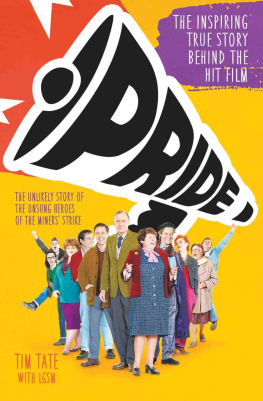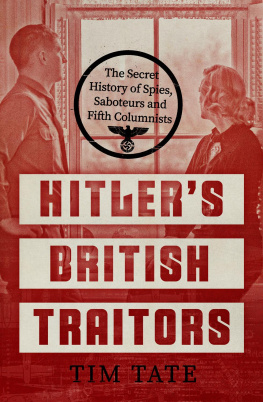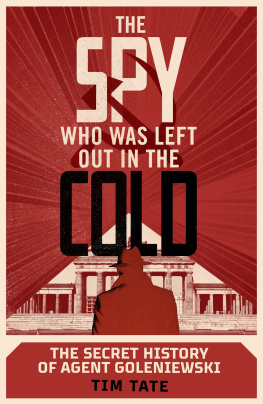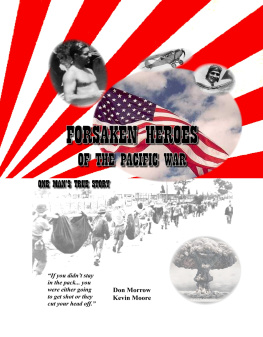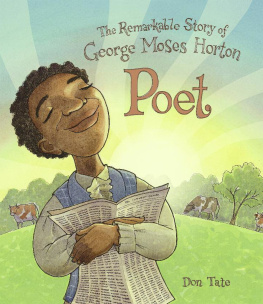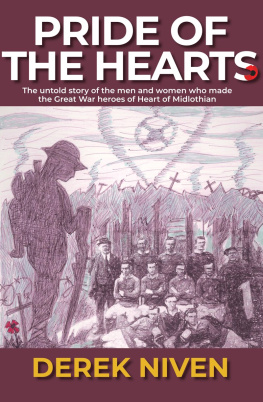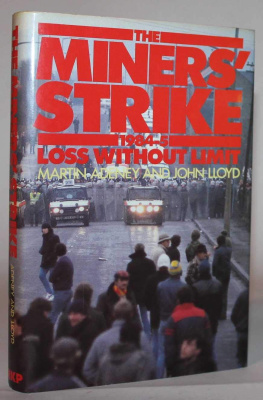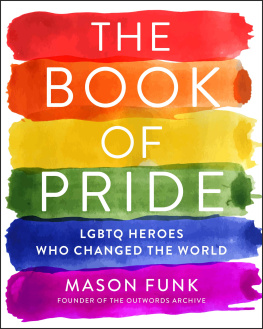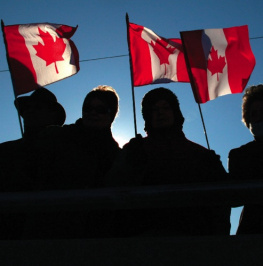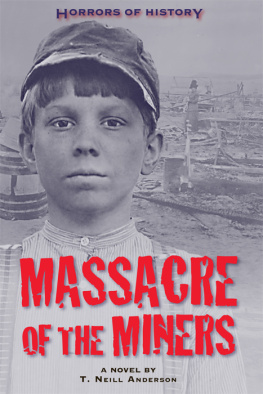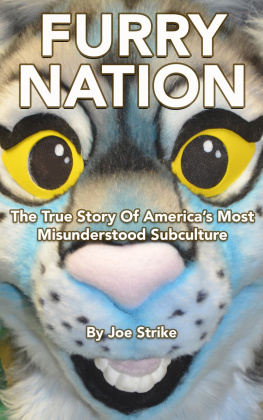Tim Tate - Pride: The Unlikely Story of the True Heroes of the Miners Strike
Here you can read online Tim Tate - Pride: The Unlikely Story of the True Heroes of the Miners Strike full text of the book (entire story) in english for free. Download pdf and epub, get meaning, cover and reviews about this ebook. year: 2018, publisher: John Blake, genre: Politics. Description of the work, (preface) as well as reviews are available. Best literature library LitArk.com created for fans of good reading and offers a wide selection of genres:
Romance novel
Science fiction
Adventure
Detective
Science
History
Home and family
Prose
Art
Politics
Computer
Non-fiction
Religion
Business
Children
Humor
Choose a favorite category and find really read worthwhile books. Enjoy immersion in the world of imagination, feel the emotions of the characters or learn something new for yourself, make an fascinating discovery.
Pride: The Unlikely Story of the True Heroes of the Miners Strike: summary, description and annotation
We offer to read an annotation, description, summary or preface (depends on what the author of the book "Pride: The Unlikely Story of the True Heroes of the Miners Strike" wrote himself). If you haven't found the necessary information about the book — write in the comments, we will try to find it.
Pride: The Unlikely Story of the True Heroes of the Miners Strike — read online for free the complete book (whole text) full work
Below is the text of the book, divided by pages. System saving the place of the last page read, allows you to conveniently read the book "Pride: The Unlikely Story of the True Heroes of the Miners Strike" online for free, without having to search again every time where you left off. Put a bookmark, and you can go to the page where you finished reading at any time.
Font size:
Interval:
Bookmark:
Shall the miners be beaten by starvation? Shall the cry of a child for food break the hearts of Britains strongest men?
A.J. C OOK, LEADER , M INERS F EDERATION OF G REAT B RITAIN, 1926
One of the reasons I support miners is that they dig coal they go down and do it. I mean, would you go down a mine and work?
M ARK A SHTON, FOUNDER, L ESBIANS AND G AYS S UPPORT THE M INERS, 1984
Dykes + faggots say Right On, Arthur
L ESBIAN AND G AYS S UPPORT THE M INERS PLACARD: NUM DEMO, L ONDON, 24 F EBRUARY 1985
F RIDAY, 26 O CTOBER 1984
D ULAIS V ALLEY, S OUTH W ALES
It was past midnight and they were lost.
The two ancient and battered mini-buses had set out from London many hours before. The twenty-seven gay men and women inside had passed much of the journey singing or leaning out of the windows and blowing flamboyant kisses at other motorists.
Now they were off the motorways and main roads, making a tortuous and erratic journey along dark and deserted lanes. They were searching for Onllwyn, a tiny dot on the map in one of the remotest valleys on the western edge of the South Wales coalfield; a very traditional mining stronghold, in the middle of the most bitterly fought strike for two generations.
They were young, idealistic and metropolitan. They were also openly and obviously out. They felt like strangers in an alien landscape. And they were nervous. Very nervous.
On the journey itself there was that sense of adventure but there was also this sinking feeling. We were thinking, What the fuck are we doing here? Because this was unknown territory: the people in the valleys could have been a whole lot of screaming homophobes.
I was super-excited; but also I felt a certain amount of anxiety. We didnt dress like the people in South Wales: we had that London look of the time. Fashion-wise, we certainly didnt look like we came from the valleys.
I thought, Jesus, this is going to be interesting. I was this ingnue; this Thoroughly Modern Millie type of person. Id only told my parents I was gay less than a year ago now I was going to a mining village as an open homosexual.
It was past midnight. They were lost. And ahead of them stretched a weekend that would change the life of the beleaguered mining communities of the Dulais Valley and help end centuries of persecution endured by gay men and lesbian women throughout Britain.
No pressure then.
T his book tells the story of one of the most unlikely alliances in living memory.
In 1984 and 1985 a small group of metropolitan homosexual men and lesbian women stepped away from the vibrant hedonism of Londons gay scene to befriend and support the beleaguered villages of a very traditional mining community in the remote valleys of South Wales.
They did so in the midst of the most divisive strike in two generations and in one of the most turbulent times in modern British history. Five years earlier, Margaret Thatchers Conservative government had begun a radical programme to change the way the country had lived since the end of World War Two. That cosy, consensual One Nation approach to politics was to be replaced with an unforgivingly right-wing approach: there was, in Mrs Thatchers own words, no such thing as society. Henceforth, greed was not just good but God: making money was more important than making things, private profit was put before public need and, above all, the costs of change were to be borne by those least able to afford them.
Traditional manufacturing industries were sacrificed on the altar of the free market; unemployment rose inexorably and, across the north of England, Scotland and Wales, community after community became as a 1981 No.1 pop song bleakly observed a Ghost Town. Simultaneously, the previously lukewarm Cold War re-froze as American nuclear missiles arrived on air bases across the country.
The Thatcher revolution was profoundly unpopular. Opposition and anger mounted; riots erupted in cities across Britain. The governmental response was to increase state surveillance and police harassment. For those who lived through the early years of the 1980s, fear of poverty, of unemployment, of the authorities and of nuclear war was a very real and constant presence.
Conflict was, perhaps, inevitable: certainly, the government had planned for it. In 1984 it erupted: twenty-two months after defeating an external enemy Argentina in the Falklands, Mrs Thatcher and her allies declared war on what the Prime Minister described as the enemy within the men whose labour powered Britains homes and industry. The year-long miners strike was the longest and most bitterly fought industrial dispute since the 1926 General Strike. It divided the country, was marred by violence and devastated previously thriving mining communities.
That the government was in its mind engaged in an existential fight against a powerful foe was confirmed by one of the ministers most closely involved: the Energy Secretary described preparations for the battles to come as just like rearming to face the threat of Hitler in the 1930s. And, just as in 1939, all the powers of the State were to be focused on ensuring victory.
But the early 1980s was also a period in which another oppressed group came under renewed and sustained attack. After hundreds of years of persecution, homosexuality had been decriminalised in England and Wales in 1967 though, as we shall see, in reality gay men and lesbian women still faced discrimination and were frequently harassed.
The 1967 Sexual Offences Act removed the threat of imprisonment for gay men (lesbians were, as they had been throughout history, largely ignored) at least in limited circumstances. It became safer if not always safe to come out: as a result, gay communities emerged from their previous shadowy existence. Openly gay pubs and clubs did good business and, in London and the bigger cities at least, a sometimes ecstatically sybaritic nightlife flourished. In 1978 the Tom Robinson Bands unequivocally defiant anthem, Glad to Be Gay, spent weeks in the Top 20.
But if homosexuality was now the love which dared to broadcast its name, the endemic prejudice against it had not gone away. The BBC refused to broadcast Robinsons song in its Top 40 chart show. More seriously, many gay men still found themselves in court after being arrested by undercover police, while others received a criminal record for having the temerity to kiss their partners in public. Queer-bashing remained a very real threat and high-profile prosecutions targeted some of the nascent communitys most important supporting organisations.
And then AIDS arrived in Britain.
In 1981 a forty-nine-year-old man was admitted to Londons Brompton Hospital suffering from pneumocystis carinii pneumonia (PCP). He died ten days later, becoming the countrys first known death from HIV/AIDS. By 1983 there were seventeen reported cases and the long-simmering prejudice against homosexuality re-surfaced. National newspapers ran endless stories about the gay plague, and public and religious leaders pronounced the disease to be Gods punishment on gay men for their sinful lifestyle. Homophobia was re-legitimised.
At the very height of this perfect storm, as the government and police battled the enemy within in communities across the land, and as newspapers whipped up fear of the perverts who had (supposedly) inflicted this lethal new pestilence upon the entire population, two groups who ostensibly had nothing in common miners and homosexuals unexpectedly made both common cause and lasting friendship.
It was an alliance that helped keep an entire valley clothed and fed during the darkest months of the strike, and it led directly to a long-overdue acceptance by trades unions and the Labour Party that homosexual equality was a cause to be championed.
Font size:
Interval:
Bookmark:
Similar books «Pride: The Unlikely Story of the True Heroes of the Miners Strike»
Look at similar books to Pride: The Unlikely Story of the True Heroes of the Miners Strike. We have selected literature similar in name and meaning in the hope of providing readers with more options to find new, interesting, not yet read works.
Discussion, reviews of the book Pride: The Unlikely Story of the True Heroes of the Miners Strike and just readers' own opinions. Leave your comments, write what you think about the work, its meaning or the main characters. Specify what exactly you liked and what you didn't like, and why you think so.

